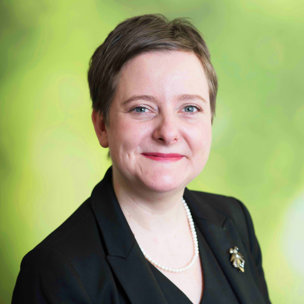Caroline’s Story
“I was diagnosed with epilepsy in 2001, whilst in Canada studying for the second year of my law degree. I was on the other side of the world to my family and friends and one moment I was in the kitchen and when I woke up, I was in a hospital in Ottawa with no idea why I was there or how I got there. I had another seizure about 2 months later, sending a table full of crockery and cutlery in a restaurant, all over the floor. Having had two seizures with no apparent reason, meant that I was then formally diagnosed with epilepsy.”
“Many people have asked me how I managed to just ‘carry on’. When I was first diagnosed with epilepsy, I was terrified. Was it going to stop me carrying on at University? Would it mean I wouldn’t be able to be a Lawyer, the only profession I have ever wanted to enter? Would I always have to have someone with me in case I have a seizure?”
“I think the diagnosis made me look at life differently and made me more driven. This doesn’t mean that it’s easy. I have had some really bad seizures resulting in 4 dislocated shoulders; breaking my collarbone twice in a month and 2 operations on my shoulders – from all those dislocations!”
I have learnt to live with my epilepsy diagnosis and try and adapt my life and work the best that I can. I know that the triggers for my seizures are stress and tiredness so I try hard to manage that.
Whilst there are some bad memories about my epilepsy, unusually I also have a few memories that make me smile and laugh. I recall having a seizure whilst in a very expensive china crockery shop and another one where I fell into a huge pile of toilet rolls that were on special offer at the end of the supermarket aisle – It was very lucky I was on that aisle, as the next one was the wine special offers – and that could have been messy!
I had a seizure one afternoon then had to turn up to Court with a black eye and bust lip (from hitting the desk on the way down) the following morning. You can’t let fear control you, or the epilepsy stop you, or you’d never leave the house.
600,000 with Epilepsy Diagnosis in the UK
Epilepsy is one of the most common neurological conditions in the world. In the UK alone, there are around 600,000 with a known diagnosis, and around the world there are 50 million worldwide with the condition. To put that into context, it’s similar to the number of people in the UK living with autism and four times higher than those living with Parkinson’s.
Every day, on average, 87 people are diagnosed with epilepsy, and each year there are around 1000 epilepsy related deaths in the UK. Deaths in people with epilepsy have increased by 70% and the life expectancy of someone with epilepsy is around 8 years shorter than someone without epilepsy.
Whilst Caroline has the type of seizures that most people associate with epilepsy (falling down and shaking on the floor), there are in fact around 60 different types of seizures. Some may be as simple as just staring into the distance and not taking notice of anything around them.
For 65% of those with epilepsy, there is no known cure. Caroline has tried over 12 different types of medication and had assessments for brain surgery, but her epilepsy is still not controlled. She now gets a lot less seizures now than she used to, and for the first few years she used to have seizures maybe once every 3 weeks. Now they tend to occur every 3 months. The doctors have not managed to discover the reason she developed epilepsy and this isn’t uncommon.
A diagnosis of epilepsy can result in some serious life changes. Your driving licence will be removed until you can go for 1 year without any seizures, and Caroline has not been able to go seizure free for a year. Sadly, Caroline wanted to follow her brother and father and go into diving, but she needed to be seizure free for 5 years to be able to do the course. Some jobs would simply not be possible – like a pilot or a train driver. Luckily, Caroline flourishes in her position at Simpson Millar.
Stigma
Epilepsy has always had a stigma attached to it. In ancient Rome people with epilepsy were avoided for fear of ‘catching it’; in the Middle Ages women with epilepsy were considered to be witches and until 1971, simply having epilepsy was a reason to prevent or annul a marriage in the UK.
Epilepsy shouldn’t cause fear or stigma for any of us but that can only happen when people stop pretending it just happens to other people. People do not always have a profound awareness of how epilepsy might affect our lives. Some peoples’ assumptions about epilepsy can be hurtful. An example of this is where a person who might be having a seizure in the street, when passer-by’s, ignorant to the possibility it could be epilepsy, assume the person is just drunk and disorderly.
Caroline finishes her message by saying, “I am a media volunteer for Epilepsy Action and I strongly believe that increasing awareness of the condition is vital. Even more importantly, encouraging those with epilepsy to strive for their dreams and to not let their diagnosis discourage them.
So this is me. I have epilepsy. Epilepsy does not have me. I am not afraid and I am not ashamed.”
The Different Types of Epilepsy
It’s important to raise awareness of epilepsy as it is often a misunderstood condition and despite years of research, it’s still not a condition we fully understand. Many people make certain associations with epilepsy, for example, seizures being triggered by flashing lights, causing a person to shake, fall on the floor and have a seizure, but there are actually 40 different types of epilepsy, and everyone experiences it differently. For example, when experiencing an epileptic seizure, some people will:
- Be fully or partially aware of what is going on around them – but may be unable to respond to you, for example as part of a focal aware seizure;
- Be conscious, but unaware of what is going on around them (absence seizures);
- Become unconscious, and have no memory of the seizure happening;
- Experience a ‘warning feeling’ or ‘aura’ that the seizure is about to start – or experience no warning at all;
- Have tonic clonic seizures, where they become unconscious, and their body goes stiff, and they jerk and shake as their muscles relax and tighten.
How Simpson Millar Could Help
There is no clear cause of epilepsy in 65% of people who are living with the condition, and sometimes there appears to be no particular trigger for seizures, which means epilepsy can get in the way of your life dramatically. However, there are certain factors that could have initially caused your epilepsy to develop, such as brain injury or substandard medical care. If this happened to you or your loved one, you could be entitled to compensation which could help you adjust to life with epilepsy and get as much support as possible.
Our court of protection solicitors could help you claim compensation for epilepsy if:
- You sustained a head/brain injury in an accident that wasn’t your fault, which caused your epilepsy to develop;
- You experienced medical negligence, which caused your epilepsy to develop;
- You were incorrectly diagnosed with epilepsy, resulting in taking unnecessary medication which failed to treat the underlying problem.




